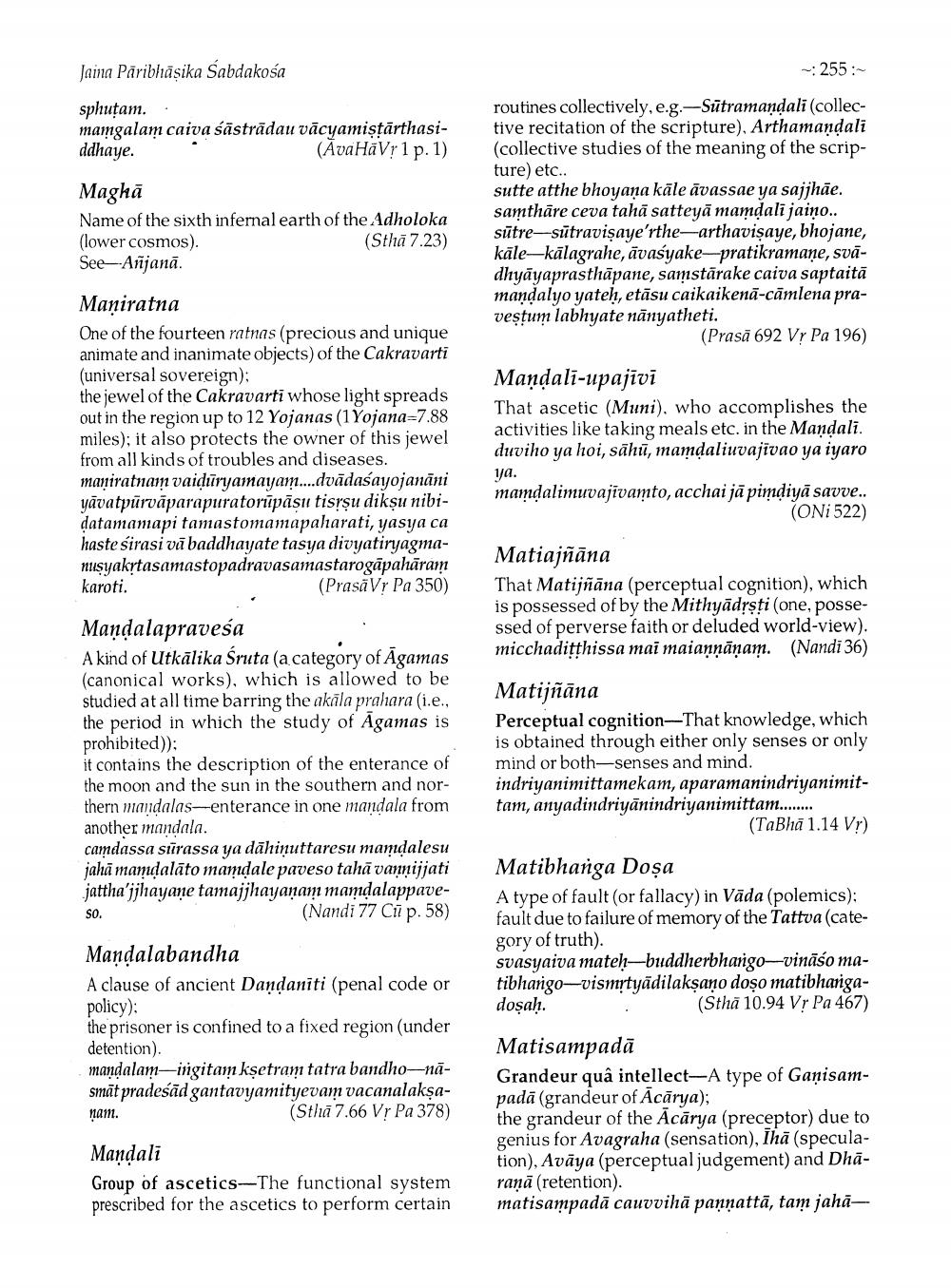________________
255:
Jaina Pāribhāsika Sabdakosa sphutam.. mamgalam caiva sāstrādau vācyamiştärthasiddhaye.
(AvaHãVr 1 p. 1)
Maghā Name of the sixth infernal earth of the Adholoka (lower cosmos).
(Sthā 7.23) See-Anjanā.
routines collectively, e.g.-Sūtramandali (collective recitation of the scripture), Arthamandali (collective studies of the meaning of the scripture) etc.. sutte atthe bhoyaņa kāle āvassae ya sajjhāe. samthāre ceva tahā satteyā mamdali jaino.. sūtre-sūtravişaye'rthe-arthavişaye, bhojane, kāle—kālagrahe, āvasyake-pratikramane, svādhyāyaprasthāpane, samstärake caiva saptaitā mandalyo yateh, etāsu caikaikenā-cāmlena pravestum labhyate nānyatheti.
(Prasā 692 V, Pa 196)
Maniratna One of the fourteen ratnas (precious and unique animate and inanimate objects) of the Cakravarti (universal sovereign): the jewel of the Cakravarti whose light spreads out in the region up to 12 Yojanas (1Yojana=7.88 miles); it also protects the owner of this jewel from all kinds of troubles and diseases. maniratnam vaiduryamayam....dvādaśayojanāni yāvatpūrvāparapuratorūpāsu tisrşu dikṣu nibidatamamapi tamastomamapaharati, yasya ca haste sirasi vā baddhayate tasya divyatiryagmanusyakytasamastopadravasamastarogāpahāram karoti.
(PrasãVr Pa 350)
Mandali-upajīvi That ascetic (Muni), who accomplishes the activities like taking meals etc. in the Mandali. duviho ya hoi, sāhū, mamdaliuvajivao ya iyaro ya. mamdalimuvajīvamto, acchai jā pimdiyā savve..
(ONi 522)
Matiajñāna That Matijñāna (perceptual cognition), which is possessed of by the Mithyādụşti (one, possessed of perverse faith or deluded world-view). micchaditthissa mai maianņāņam. (Nandi 36)
Mandalapravesa A kind of Utkālika Śruta (a category of Āgamas (canonical works), which is allowed to be studied at all time barring the akala prahara (i.e., the period in which the study of Agamas is prohibited)); it contains the description of the enterance of the moon and the sun in the southern and northern mandalas-enterance in one mandala from another mandala. camdassa sürassa ya dāhinuttaresu mamdalesu jahā mamdalāto mamdale paveso tahā vannijjati jattha'jjhayane tamajjhayanam mamdalappave
(Nandi 77 Cū p. 58)
Matijñāna Perceptual cognition—That knowledge, which is obtained through either only senses or only mind or both-senses and mind. indriyanimittamekam, aparamanindriyanimittam, anyadindriyānindriyanimittam.......
(TaBhā 1.14 Vr)
so.
Matibhanga Dosa A type of fault (or fallacy) in Vāda (polemics); fault due to failure of memory of the Tattva (category of truth). svasyaiva mateh—buddherbharigo—vināso matibhango--vismytyādilakṣaṇo doso matibhangadoṣaḥ.
(Sthā 10.94 V? Pa 467)
Mandalabandha A clause of ancient Dandaniti (penal code or policy); the prisoner is confined to a fixed region (under detention). mandalam-ingitam kşetram tatra bandho-nasmāt pradeśād gantavyamityevam vacanalaksanam.
(Sthā 7.66 Vr Pa 378)
Matisampadā Grandeur quâ intellect-A type of Ganisampadā (grandeur of Ācārya); the grandeur of the Ācārya (preceptor) due to genius for Avagraha (sensation), īhā (speculation), Avāya (perceptual judgement) and Dhāraņā (retention). matisampadā cauvvihä pannattā, tam jahā--
Mandali Group of ascetics--The functional system prescribed for the ascetics to perform certain




